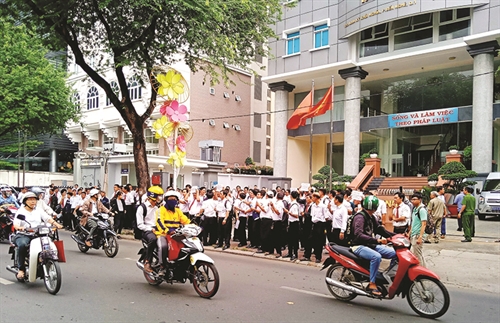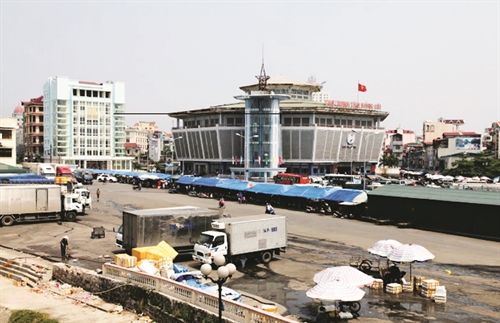The draft revised Labor Code, which is expected to be passed by the National Assembly this October, contains several noteworthy amendments to the current regulations on wages.
Under Article 91 of the current Labor Code (the Code), minimum wage is defined as the lowest wage which is paid to an employee performing the simplest job in normal working conditions and must ensure the minimum living needs of the employee and his family.
The draft law now amends Article 91 of the Code, shortening the definition of minimum wage into “the lowest wage paid to an employee performing a simple job in normal working conditions.” At the same time, a new article, Article 92, is added, laying out five criteria for setting and adjusting the minimum wage level, including: (i) the minimum living needs of workers and their families; (ii) interrelation between the minimum wage and universal wage level in the market; (iii) consumer price index and economic growth rate; (iv) labor supply and demand, and employment and unemployment rates; and (v) productivity and businesses’ payment capacity.
So, what is the reason for such amendments and will they bring about any benefits for workers?
For the time being, despite the legal requirement that the minimum wage must ensure the minimum living needs of workers and their families, actual wages of many laborers, especially industrial park workers, remain far below living wages.
According to a report released by the Center for Development and Integration (CDI), a local non-governmental organization, at a seminar titled “Current wages and solutions toward living wages in Vietnam’s garment industry” held last month in Hanoi by the CDI, the Fair Wear Foundation, and Oxfarm Vietnam, most workers in the industry are paid with wages which are not enough to cover their basic needs.
“With their current wages, most workers can afford only food, and in order to meet other essential needs such as travel, healthcare, clothing and education, most of them have to work overtime,” the report revealed.
Le Dinh Quang, deputy head of the Industrial Relations Department of the Vietnam General Confederation of Labor (VGCL), told the local news web Dan Tri that the current minimum wage level manages to satisfy around 95 percent of the minimum living needs. However, it is worth noting that minimum living needs are not constant but alterable depending on changes in living conditions. Therefore, there is always a gap between the law-prescribed minimum wage and desirable living wage. It is not to mention the fact that a living wage covering eight essential factors, including nutritious food, decent housing, healthcare, utilities, education, clothing, transportation, and savings, is still a new concept in Vietnam.
However, experts still wonder about the effects of revisions to current wage regulations.
Vu Quang Tho, former head of the VGCL’s Workers and Trade Union Institute, told Dan Tri that the proposed amendments would, to some extent, counteract the protective effects of the law for workers.
Citing his experiences of working as a member of the National Wage Council, Tho said legal provisions on minimum wage were naturally considered one of major “pillars” in annual minimum wage adjustment negotiations.
“Every year, when setting the minimum wage level, the National Wage Council always adheres to the concept that minimum wage is the lowest wage which is paid to an employee performing the simplest job in normal working conditions and must ensure the minimum living needs of the employee and his family,” Tho gushed, adding that such definition has been recognized by the International Labor Organization (ILO).
 |
| Processing aquatic products at the Southern Fisheries Company Ltd.__Photo: Vu Sinh/VNA |
According to Tho, if the requirement that the minimum wage “must ensure the minimum living needs of the employee and his family” is removed from the concept of minimum wage and regarded just as one of the criteria for setting and adjusting the minimum wage level, the “layers of protection” for workers will imperceptibly be diminished.
Mai Duc Thien, deputy director of the Ministry of Labor, Invalids and Social Affairs’ Legal Department affirmed with the Thoi bao Tai chinh (Vietnam Financial Times) newspaper that wages will be set on the basis of negotiation between employers and employees under the market mechanism. However, the State will, by legal instruments, protect legitimate rights of workers and not allow employers to pay wages lower than the prescribed minimum wage.
Analyzing the factor of “payment capacity of enterprises”, which is included in the set of five criteria for setting and adjusting the minimum wage, Thien said it is a relatively important factor as a minimum wage level which exceeds enterprises’ payment capacity might affect their productivity and competitiveness.
Labor expert Tho disagreed with Thien’s viewpoint. “In the past when working as a member of the National Wage Council, I used to say that if wishing to conduct production and business activities, enterprises must have sufficient capital, taking into account the amount of funds needed for payment of wages to their employees. If enterprises feel too “weak”, let’s not hire labor. But once they have joined the market, they must accept the set wage level,” Tho was quoted by Dan Tri as saying.
The draft also allows enterprises to build their own wage scales and tables. Accordingly, employers may take the initiative in formulating wage scales, wage tables and labor norms for use as a basis for labor recruitment, negotiation of the wage levels to be inscribed in employment contracts, and payment of wages to employees. But they must consult employees’ organizations on the formulation of wage scales and tables and publicize such information at their production and business locations.
Noteworthily, the draft says labor norms must be advanced average levels which can be attained by almost all laborers without requiring prolongation of the normal working hours. Besides, labor norms must be applied on a pilot basis before being officially issued.
Regarding wage payment, the draft requires enterprises to pay wages to their employees on time. If delaying wage payment for 15 days or longer, employers must pay a compensation at least equaling the late-paid wage amount multiplied by the interest rate for deposits with a term of one month. However, in all cases, employers may not delay wage payment for more than one month. In addition, enterprises are prohibited from using tricks to force employees to spend wages on the goods or services sold by the enterprises themselves or by other units designated by the enterprises.- (VLLF)









